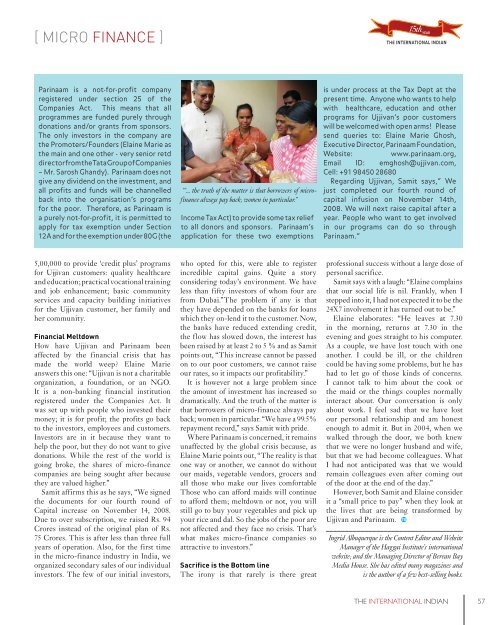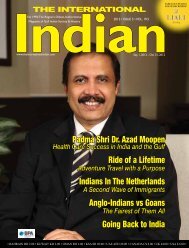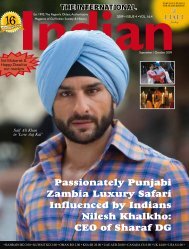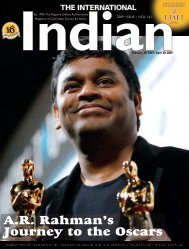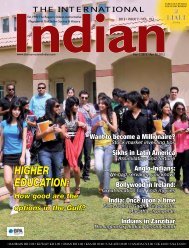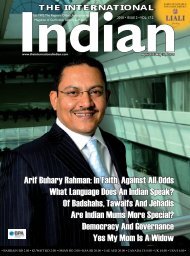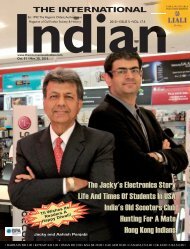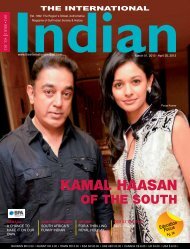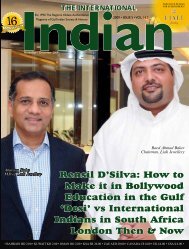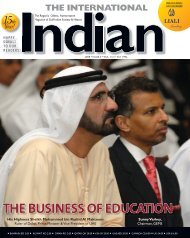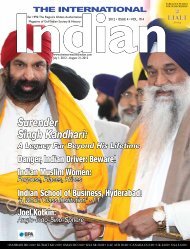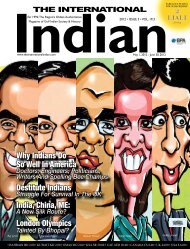THE INTERNATIONAL - International Indian
THE INTERNATIONAL - International Indian
THE INTERNATIONAL - International Indian
Create successful ePaper yourself
Turn your PDF publications into a flip-book with our unique Google optimized e-Paper software.
[ MICRO FINANCE ]<br />
Parinaam is a not-for-profit company<br />
registered under section 25 of the<br />
Companies Act. This means that all<br />
programmes are funded purely through<br />
donations and/or grants from sponsors.<br />
The only investors in the company are<br />
the Promoters/Founders (Elaine Marie as<br />
the main and one other - very senior retd<br />
director from the Tata Group of Companies<br />
– Mr. Sarosh Ghandy). Parinaam does not<br />
give any dividend on the investment, and<br />
all profits and funds will be channelled<br />
back into the organisation’s programs<br />
for the poor. Therefore, as Parinaam is<br />
a purely not-for-profit, it is permitted to<br />
apply for tax exemption under Section<br />
12A and for the exemption under 80G (the<br />
‘“... the truth of the matter is that borrowers of microfinance<br />
always pay back; women in particular.”<br />
Income Tax Act) to provide some tax relief<br />
to all donors and sponsors. Parinaam’s<br />
application for these two exemptions<br />
is under process at the Tax Dept at the<br />
present time. Anyone who wants to help<br />
with healthcare, education and other<br />
programs for Ujjivan’s poor customers<br />
will be welcomed with open arms! Please<br />
send queries to: Elaine Marie Ghosh,<br />
Executive Director, Parinaam Foundation,<br />
Website:<br />
www.parinaam.org,<br />
Email ID: emghosh@ujjivan.com,<br />
Cell: +91 98450 28680<br />
Regarding Ujjivan, Samit says,“ We<br />
just completed our fourth round of<br />
capital infusion on November 14th,<br />
2008. We will next raise capital after a<br />
year. People who want to get involved<br />
in our programs can do so through<br />
Parinaam.”<br />
5,00,000 to provide ‘credit plus’ programs<br />
for Ujjivan customers: quality healthcare<br />
and education; practical vocational training<br />
and job enhancement; basic community<br />
services and capacity building initiatives<br />
for the Ujjivan customer, her family and<br />
her community.<br />
Financial Meltdown<br />
How have Ujjivan and Parinaam been<br />
affected by the financial crisis that has<br />
made the world weep? Elaine Marie<br />
answers this one: “Ujjivan is not a charitable<br />
organization, a foundation, or an NGO.<br />
It is a non-banking financial institution<br />
registered under the Companies Act. It<br />
was set up with people who invested their<br />
money; it is for profit; the profits go back<br />
to the investors, employees and customers.<br />
Investors are in it because they want to<br />
help the poor, but they do not want to give<br />
donations. While the rest of the world is<br />
going broke, the shares of micro-finance<br />
companies are being sought after because<br />
they are valued higher.”<br />
Samit affirms this as he says, “We signed<br />
the documents for our fourth round of<br />
Capital increase on November 14, 2008.<br />
Due to over subscription, we raised Rs. 94<br />
Crores instead of the original plan of Rs.<br />
75 Crores. This is after less than three full<br />
years of operation. Also, for the first time<br />
in the micro-finance industry in India, we<br />
organized secondary sales of our individual<br />
investors. The few of our initial investors,<br />
who opted for this, were able to register<br />
incredible capital gains. Quite a story<br />
considering today’s environment. We have<br />
less than fifty investors of whom four are<br />
from Dubai.”The problem if any is that<br />
they have depended on the banks for loans<br />
which they on-lend it to the customer. Now,<br />
the banks have reduced extending credit,<br />
the flow has slowed down, the interest has<br />
been raised by at least 2 to 5 % and as Samit<br />
points out, “This increase cannot be passed<br />
on to our poor customers, we cannot raise<br />
our rates, so it impacts our profitability.”<br />
It is however not a large problem since<br />
the amount of investment has increased so<br />
dramatically. And the truth of the matter is<br />
that borrowers of micro-finance always pay<br />
back; women in particular. “We have a 99.5%<br />
repayment record,” says Samit with pride.<br />
Where Parinaam is concerned, it remains<br />
unaffected by the global crisis because, as<br />
Elaine Marie points out, “The reality is that<br />
one way or another, we cannot do without<br />
our maids, vegetable vendors, grocers and<br />
all those who make our lives comfortable<br />
Those who can afford maids will continue<br />
to afford them; meltdown or not, you will<br />
still go to buy your vegetables and pick up<br />
your rice and dal. So the jobs of the poor are<br />
not affected and they face no crisis. That’s<br />
what makes micro-finance companies so<br />
attractive to investors.”<br />
Sacrifice is the Bottom line<br />
The irony is that rarely is there great<br />
professional success without a large dose of<br />
personal sacrifice.<br />
Samit says with a laugh: “Elaine complains<br />
that our social life is nil. Frankly, when I<br />
stepped into it, I had not expected it to be the<br />
24X7 involvement it has turned out to be.”<br />
Elaine elaborates: “He leaves at 7.30<br />
in the morning, returns at 7.30 in the<br />
evening and goes straight to his computer.<br />
As a couple, we have lost touch with one<br />
another. I could be ill, or the children<br />
could be having some problems, but he has<br />
had to let go of those kinds of concerns.<br />
I cannot talk to him about the cook or<br />
the maid or the things couples normally<br />
interact about. Our conversation is only<br />
about work. I feel sad that we have lost<br />
our personal relationship and am honest<br />
enough to admit it. But in 2004, when we<br />
walked through the door, we both knew<br />
that we were no longer husband and wife,<br />
but that we had become colleagues. What<br />
I had not anticipated was that we would<br />
remain colleagues even after coming out<br />
of the door at the end of the day.”<br />
However, both Samit and Elaine consider<br />
it a “small price to pay” when they look at<br />
the lives that are being transformed by<br />
Ujjivan and Parinaam.<br />
Ingrid Albuquerque is the Content Editor and Website<br />
Manager of the Haggai Institute’s international<br />
website; and the Managing Director of Berean Bay<br />
Media House. She has edited many magazines and<br />
is the author of a few best-selling books.<br />
<strong>THE</strong> <strong>INTERNATIONAL</strong> INDIAN 57


